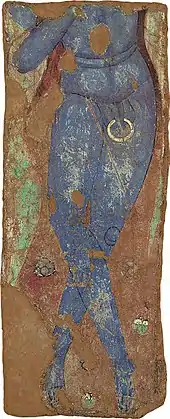Fibula (penile)
A penile fibula is foremost a ring, attached with a pin through the foreskin to fasten it above the glans penis.[1] It was mainly used by ancient Roman culture, though it may have originated earlier.[2] This ring type of fibula has been described akin to a "large modern safety pin".[3] Its usage may have had several reasons, for example to avoid intercourse, to promote modesty or the belief that it helped preserve a man's voice. Some Jews also utilized fibulas to hide that they were circumcised.[4][5] The word fibula could also be used in general in Rome to denote any type of covering of the penis (such as with a sheath) for the sake of voice preservation or sexual abstinence, it was often used by masters on their slaves for this purpose.[6] Fibulas were frequent subject of ridicule among satirists in Rome.[7][8][6][3][9]


Infibulation could be also a surgical procedure in which two holes were pierced in the foreskin, so a metal clasp could be locked on them to close the prepuce shut. This procedure was similarly criticized by Celsus.[10]
See also
- Boxer at Rest, a Hellenistic Greek sculpture showing infibulation
- Kynodesme
- Koteka, a type of penis sheath
References
- Schultheiss, D.; Mattelaer, J.J.; Hodges, F.M. (2003). "Preputial infibulation: From ancient medicine to modern genital piercing". BJU International. 92 (7): 758–763. doi:10.1046/j.1464-410X.2003.04490.x. PMID 14616462.
- Buchli, Victor (2017). Material culture : critical concepts in the social sciences. Vol. 1 : Pt. 2. Taylor & Francis. ISBN 9780415267205.
- Younger, John (2004). Sex in the Ancient World from A to Z. Routledge. ISBN 9781134547029.
- "Epispasm: Circumcision in Reverse". www.cirp.org.
- "The Ancient World". Ares Publishers. 1985.
- Golden, Mark; Toohey, Peter (1997). Inventing Ancient Culture: Historicism, Periodization and the Ancient World. Psychology Press. ISBN 9780415099608.
- Rubin, Nissan (2008). Time and Life Cycle in Talmud and Midrash: Socio-anthropological Perspectives. Academic Studies Press. pp. 54–. ISBN 978-1-934843-07-9.
- Hubbard, Thomas K. (2013). A Companion to Greek and Roman Sexualities. Wiley. pp. 356–. ISBN 978-1-118-61068-8.
- "Infibulation". www.sacred-texts.com.
- Frederick M. Hodges, The Ideal Prepuce in Ancient Greece and Rome: Male Genital Aesthetics and Their Relation to Lipodermos, Circumcision, Foreskin Restoration, and the Kynodesme. Bulletin of the History of Medicine, volume 57, p. 375-405